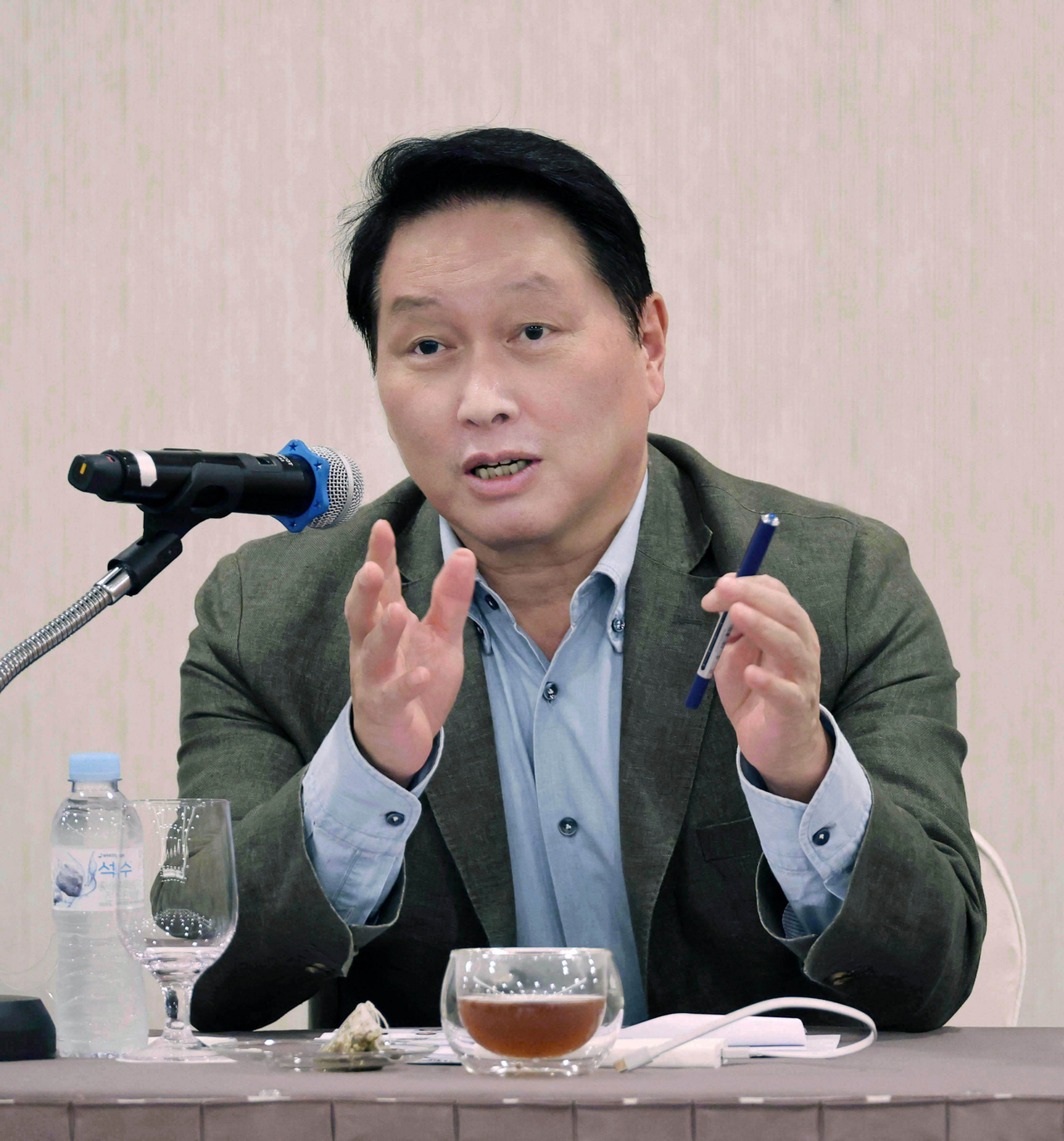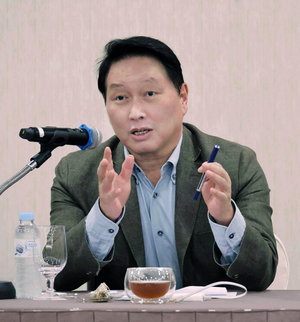Chey Tae-won says tie-up between neighbors in AI, manufacturing could be key to weathering global economic storm
 Chey Tae-won, chairman of the Korea Chamber of Commerce and Industry and SK Group, speaks to reporters during a press conference held on the sidelines of the KCCI summer forum in Gyeongju, North Gyeongsang Province, Thursday. (KCCI)
Chey Tae-won, chairman of the Korea Chamber of Commerce and Industry and SK Group, speaks to reporters during a press conference held on the sidelines of the KCCI summer forum in Gyeongju, North Gyeongsang Province, Thursday. (KCCI)
Chey Tae-won, chairman of SK Group and the Korea Chamber of Commerce and Industry, doubled down on his proposal for a Korea-Japan economic bloc that is akin to the EU, stressing that the two nations must strengthen cooperation in AI and manufacturing sectors as global economic uncertainties intensify.
Envisioning a bloc that would unite the two neighbors — both grappling with stagnant domestic economies, aging population and rising global trade barriers — Chey has been advocating such a union would create a $6 trillion economic zone, making it the world’s fourth-largest economy, one that would be better places to combat these shared challenges.
“The question is: Is Korea okay the way it is? If not, we need to explore new options that we have never tried before,” Chey told reporters during a press conference Thursday on the sidelines of the 48th KCCI summer forum held in Gyeongju, North Gyeongsang Province.
“A Korea-Japan economic bloc could be one of those options, and it can grow into a community like the EU,” he added.
Chey acknowledged the proposal may meet with mixed public sentiment, but noted that many Japanese business and political leaders he met were not opposed to the idea. He met with Japanese Prime Minister Shigeru Ishiba in May, advocating for deeper economic cooperation between the two countries.
“Japan thinks a lot more in terms of economic security and it is my understanding that Prime Minister Ishiba is also putting a lot of efforts and interest into it as well,” he said.
Chey pinpointed artificial intelligence and manufacturing as two critical areas where Korean and Japanese expertise could combine forces.
“To do AI well, we have to join hands with Japan and exchange data with each other,” he said, noting Korea’s domestic industry, manufacturing scale and data alone are not big enough on their own.
“When Korea and Japan combine data together, we can even achieve at least some competitiveness,” he said. “There are many issues South Korea cannot resolve alone.”
He believes AI could be the very key to tackle Korea’s dwindling manufacturing industry.
“In this era of AI, if Korea fails to rebuild its manufacturing industry through AI, a large portion of Korea’s manufacturing industry could be wiped out within a decade, he said. “It’s a grim scenario, but AI is our only hope at this point.”
Chey raised alarm over China’s rapid adoption of AI.
“In AI, China is catching up and applying it faster than we are. Korea needs to catch up as soon as possible to stay competitive,” he said.
On the domestic front, Chey called for efforts to scale Korea’s AI ecosystem, including the development of infrastructure, the cultivation of talent and the nurturing of a vibrant startup environment.
“What I want to ask the government is this: Create a market. We need public sector-led AI projects,” he said. “Once these projects are launched, startups, mid-sized firms and large companies can all participate and make something. That’s how we can increase the number of people with experience and training in AI.”
To that end, infrastructure is critical, he added.
“We need to make many applications for accessible AI, but more importantly, we need the infrastructure to support them, like AI data centers with GPU capacity,” he added.
Such resources should be publicly available for startups and SMEs to train AI models and develop practical product.
Chey, who is hosting the upcoming APEC CEO Summit in October in Gyeongju, said he hoped the event would promote international cooperation not only in AI, but also in solving broader challenges such as trade issues.
“One thing I would like to see come out of APEC is a clear solution to the tariff issues,” he said but adding it would be ideal if the matter could be resolved before the summit. “If tariff issues are resolved, it would be a strong signal that economic threats are easing.
Beyond tariffs, Chey said he expressed home for new types of cooperation in AI, semiconductors, shipbuilding, steel and automobiles.
Chey said he is putting all out efforts to invite many global business leaders to the upcoming meeting.
“Our approach now is to ask the (leaders) who they want to meet when they come to Korea,” he said. “If they believe they can meet someone important to them here, the likelihood of attendance will increase. Because ultimately, they need a clear reason to come.”
sahn@heraldcorp.com
